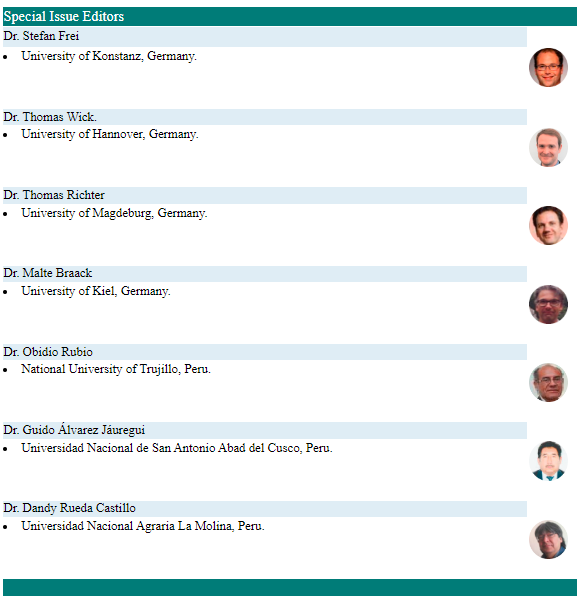Equivalence of the stability of discrete-time Markov jump linear systems
DOI:
https://doi.org/10.17268/sel.mat.2020.02.05Palavras-chave:
Stability, discrete-time Markov jump linear system, Markov chainResumo
This paper investigates the stability of discrete-time Markov jump linear system of second-order, this type of system is similar to the family of discrete-time Markov jump linear system it is known in classical literature as MJLS. We present some consistent stability definitions for the system, where these types of stability are equivalent as long as the state space Markov chain is finite. In addition, a computational test is presented to analyze the stability of the system. The result is a generalization of classical theory, this implies a contribution to the theory.
Referências
Li X, Hui D, Lai X, Yan T. Power quality control in wind fuel cell battery hydrogen electrolyzer hybrid microgrid power system. In: Ognyan Ivanov editor. Applications and Experiences of Quality Control. Rijeka: INTECH; 2011. p. 579-594. Avalible form: https://www. intechopen. com /books/ applications-and-experiences-of-quality-control/power- quality- control-inwind-fuel-cell-battery-hydrogen-electrolyzer-hybrid-micro-grid-power-system
Ugrinovskii V, Pota HR. Decentralized control of power systems via robust control of uncertain Markov jump parameter systems. Int. J. of Control. 2005; 78(9):662-677.
Meskin N, Khorasani K. Fault detection and isolation of discrete-time Markovian jump linear systems with application to a network of multi-agent systems having imperfect communication channels. Automatica. 2009; 45(9):2032-2040.
Gray WS, González OR, Dogan M. Stability analysis of digital linear flight controllers subject to electromagnetic disturbances. IEEE Trans. on Aerospace and Electronic systems. 2000; 36(4):1204-1218.
Li J-R, Sculley J, Zhou, H-C. Metal–organic frameworks for separations. Chem. rev. 2012; 112(2):869-932.
Sworder D, Rogers R. An LQ-solution to a control problem associated with a solar thermal central receiver. IEEE Trans. on Automatic Control. 1983; 28(10):971-978.
Tesfaye S, Boulton AJ, Dyck PJ, Freeman R, Horowitz, M, Kempler P, Bernardi L. Diabetic neuropathies: update on definitions, diagnostic criteria, estimation of severity, and treatments. Diabetes care. 2010; 33(10):2285-2293.
Blom HA, Bar-Shalom Y. The interacting multiple model algorithm for systems with Markovian switching coefficients. IEEE trans. on Automatic Control. 1988; 33(8):780-783.
Brewer J. Kronecker products and matrix calculus in system theory. IEEE Trans. on circuits and systems. 1978; 25(9):772-781.
Blankenship G. Stability of linear differential equations with random coefficients. IEEE Trans. on Automatic Control. 1977; 22(5):834-838.
Feng X, Loparo KA, Ji Y, Chizeck HJ. Stochastic stability properties of jump linear systems. IEEE Trans. on Automatic Control. 1992; 37(1):38-53.
Chizeck HJ,Willsky AS, Castanon D. Discrete-time Markovian-jump linear quadratic optimal control. Int. J. of Control. 1986; 43(1):213-231.
Ji Y, Chizeck HJ. Controllability, observability and discrete-time Markovian jump linear quadratic control. Int. J. of Control. 1988; 48(2):481-498.
Fang Y, Loparo KA. Stochastic stability of jump linear systems. IEEE trans. on automatic control. 2002; 47(7):1204-1208.
Costa OLV, Fragoso MD, Marques RP. Discrete-time Markov jump linear systems. New York: Springer Science & Business Media; 2005.
Downloads
Publicado
Como Citar
Edição
Seção
Licença
Os autores que publicam nesta revista aceitam as seguintes condições:
Os autores mantêm os direitos autorais e atribuem à revista o direito da primeira publicação, com o trabalho registrado com a licença de atribuição Creative Commons Atribución 4.0 Internacional (CC BY 4.0), que permite que terceiros usem o material publicado sempre que mencionarem a autoria do trabalho e os direitos autorais. Primeira publicação nesta revista.
Os autores podem fazer outros acordos contratuais independentes e adicionais para a distribuição não exclusiva da versão do artigo publicada nesta revista (por exemplo, incluí-la em um repositório institucional ou publicá-la em um livro), desde que afirme claramente que o trabalho Foi publicado nesta revista.
É permitido e recomendado aos autores que publiquem seus trabalhos na Internet (por exemplo, em páginas institucionais ou pessoais) antes e durante o processo de revisão e publicação, pois isso pode levar a trocas produtivas e a uma disseminação maior e mais rápida do trabalho. publicado (Consultar: efeito do acesso aberto).












